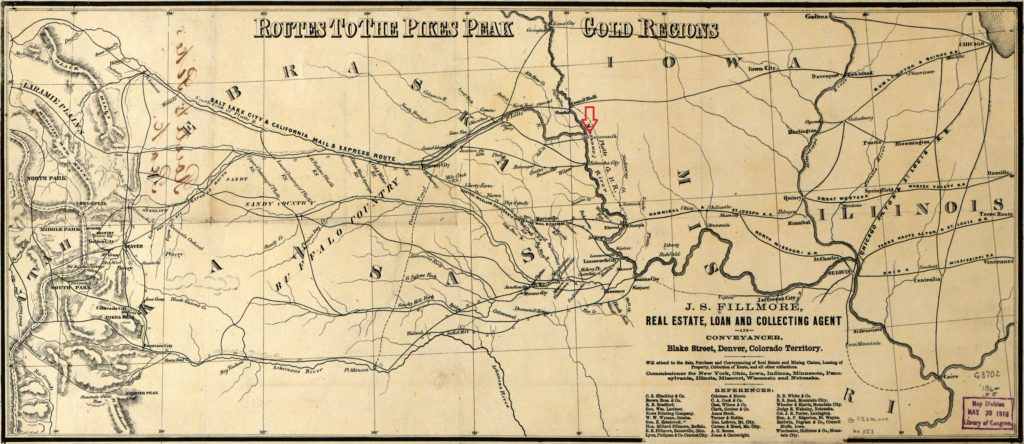A Pioneer Story: Pioneer Days, Part 4, Heading West

This would be different than his first trip looking for gold, when he was a younger and single man. This time the young family would all go: J.W., Laura, and the two very young children (Willie and Nettie). Since the farm had no livestock left, there was nothing required but to outfit themselves with enough to stay at least one year. Laura did not say that they sold the land they owned, and a plan to stay at least a year suggests they intended to be able to come back if they did not find what they were looking for. Based on Bureau of Land Management records J.W. owned at least 160 acres of land at the time they were preparing to leave for the Rockies. I have not searched the land records further to see if or when they sold the land.
With a wife and children along they would need “two teams to transport the necessary amount of provisions and household goods for so lengthy a stay.” In the two months they had to wait for winter to be past and the roads to have dried, they learned from experienced travelers “that horses could not endure the trip as well as oxen, as the latter could graze at night and thus obtain most of the necessary food… taking for granted that what we heard was true, we accepted the inevitable…” They planned to travel with their horses to the southern part of the state to visit a relative there ”with whom we had arranged to exchange our horses for two yokes of oxen.” Laura does not say who this relative was or exactly where, but she did say it took them a week’s travel to go a distance of about 150 miles.
I had thought it might have been Laura’s aunt Jane Denman’s family that they planned to make this exchange with. Jane Denman had married first Miles Wheaton in New York and on his death she married Perry Durfee in Illinois. She had joined the Church of the Latter Day Saints, perhaps in order to marry Perry Durfee or perhaps that was how she met him. At any rate, although the Durfee family was in Pottawattamie County, Iowa in 1850 (by the census), by 1860 they were in California (also by the census). Thus it seems unlikely that this was the relative. There was also a William H. Denman who had bought land (based on Bureau of Land Management records) in Iowa, in two different locations, one of the Pottawattamie County, however there is no evidence that he ever lived there. Furthermore, I do not yet know how he fits into the family tree.
The Booth family was enumerated in Plattville Township, Mills County, Iowa (just south of Pottawattamie) in June for the 1860 census, having left “our uncles” on about the 12 of May. It was at this point that they had truly started the long journey across the plain, and in the first month with the slower oxen teams they had not yet crossed the Missouri River into Nebraska. An interesting note from the census: although Laura had mentioned two family names of people accompanying them (a minister named Gilliland and his family, and the Booth brother-in-law George Beed whose wife was visiting in Ohio), they do not appear to have camped together at the time of the census. Neither of these names showed up on the 1860 census with the Booths, but showed up in another area of Plattville Township together, on an earlier date (June 2 as compared to June 8 for the Booth enumeration). Also interestingly, although George Beed was reported to be traveling on his own with his wife in Ohio, he listed his wife and young son. Marinda (called Clarinda on the Iowa enumeration) and Arthur W (or A.W. on the Ohio enumeration) were clearly counted twice. They were also enumerated on the Ohio 1860 census in her father’s household (on July 2).
Laura described the travel, the camping and sleeping arrangements, and a runaway team that enlivend one day of their early traveling. Although she described the great interest of the party in reaching and seeing the Missouri River, she also noted that she did not remember “the manner of crossing the river but suppose it was by ferry”. With that crossing they reached Plattsmouth, Nebraska and received their mail, the first since leaving home she notes (although she says first for the two weeks since leaving their homes, which doesn’t fit with what she wrote before and I think she meant two months). All were glad to hear from friends and family, and Laura reported that their “English brother” received a letter from his wife pleading with him to return home and out of the danger all feared from the Indians. He was reported as dutifully doing so, abandoning his trip and returning to Ohio to take his family back to their Iowa home.
For now I will leave the Booths and their companions as they begin the trek across Nebraska toward Colorado. Next time I will follow them as they made their way West.
Note: the map at the top was done in 1861; the red arrow shows where Plattsmouth, Nebraska is and the Booth homestead isn’t shown, being in the central northern part of Iowa that isn’t shown on the map.

Leave a Reply